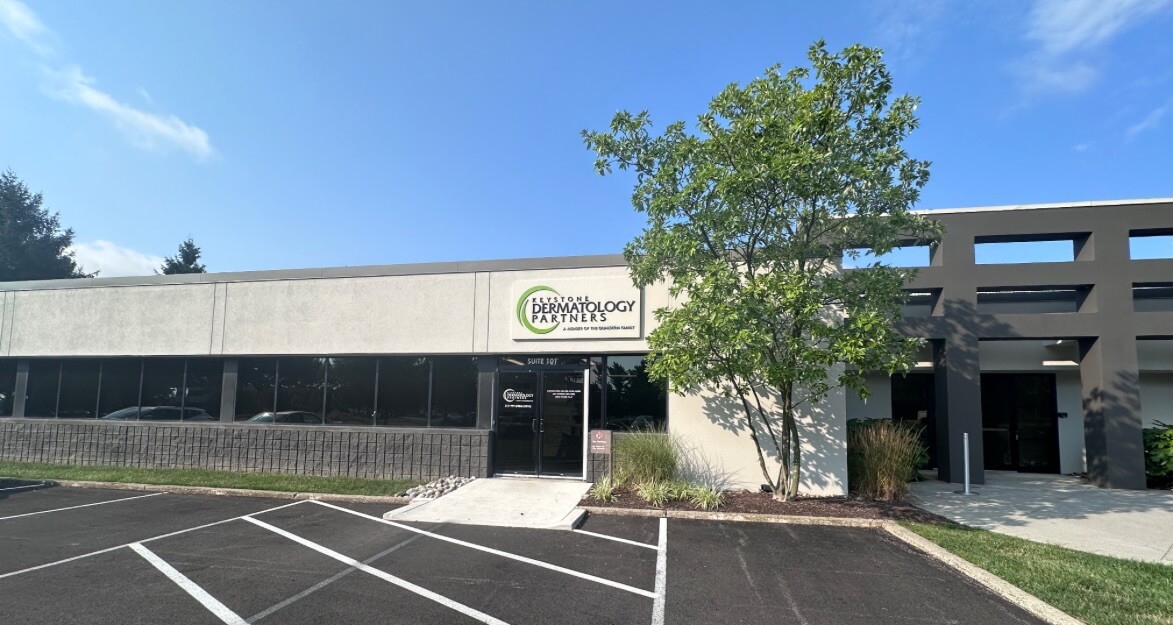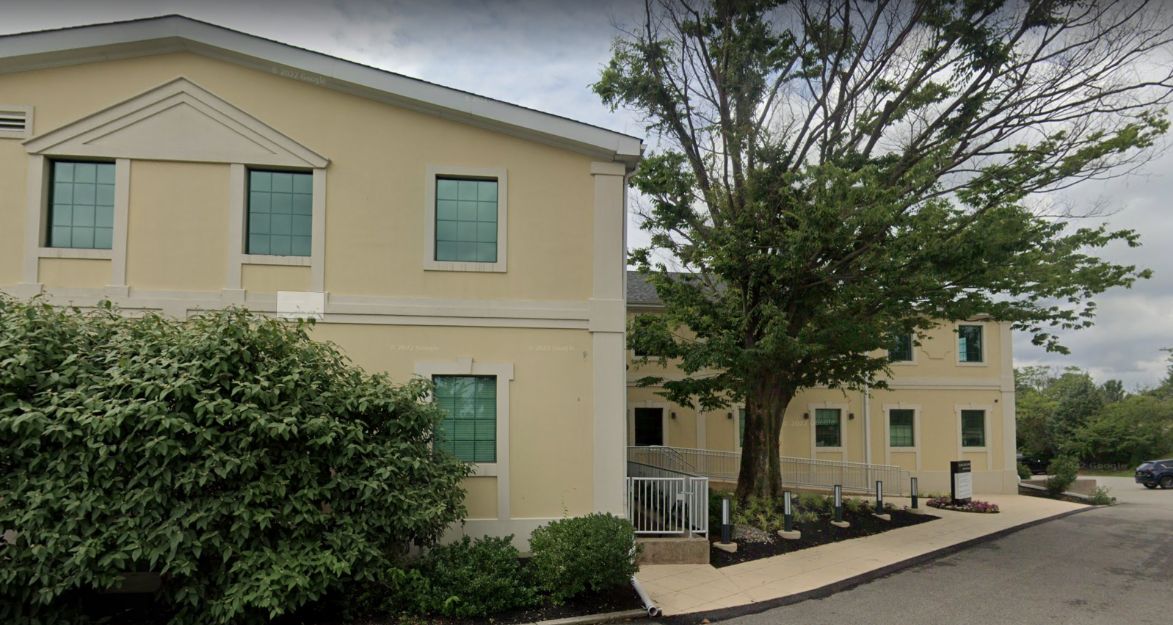Squamous Cell Carcinoma
Understanding and Treating Skin Cancer at Keystone Dermatology: Squamous Cell Carcinoma (SCC)
Squamous cell carcinoma (SCC) is the second most common type of skin cancer, often developing on sun-exposed areas such as the head, neck, ears, lips, arms, legs, and hands.
Regular skin checks with a dermatologist at Keystone Dermatology Partners of Philadelphia are vital for detecting squamous cell carcinoma early. Our expert dermatologists are trained to identify suspicious lesions, growths, or skin changes that may indicate SCC. Self-examinations are also essential, enabling individuals to monitor for any persistent sores, rough patches, or raised nodules.
Combining professional evaluations with self-exams significantly improves the chances of early detection of SCC, leading to better treatment success rates and outcomes. This highlights the importance of regular dermatological checks and self-monitoring to maintain optimal skin health.
At Keystone Dermatology Partners, your skin health is our highest priority. Our dedicated team of professionals is here to support you and your family at every step of your skin health journey. We are committed to delivering exceptional care and personalized guidance to meet your unique skin wellness needs.
If you have concerns about SCC or need a skin check, schedule an appointment with Keystone Dermatology Partners today. We are here to provide expert care and help you achieve and maintain healthy, cancer-free skin.
Examples of Squamous Cell Carcinoma
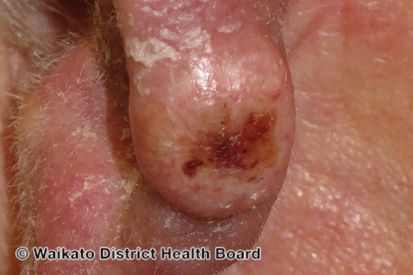
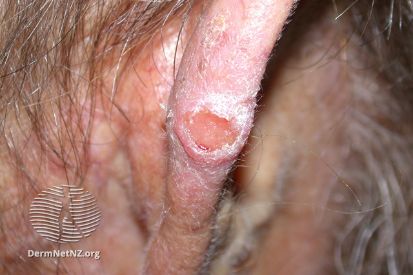
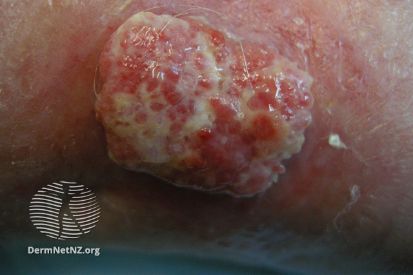
Warning
This content contains sensitive images.
Squamous Cell Carcinoma Symptoms
- Forms on exposed areas like your neck, ears, lips, hands, arms, or back
- Firm red nodule, a flat sore, or a scaly patch.
- Rough sore inside your mouth
- Wart-like sores on your genital area
Squamous Cell Carcinoma Causes
- Due to changes in cells’ DNA, causing abnormal growth and multiplication
- Prolonged exposure to ultraviolet radiation is the main culprit
- UV light from the sun, tanning beds, and lamps
Squamous Cell Carcinoma Diagnosis
During the consultation, you will be asked about your lifestyle and medical history. This will give Dr. Perlis an idea of the cause and the course of treatment to follow.
If you are worried that you may have skin cancer, contact us for a consultation regarding squamous cell carcinoma in Philadelphia. Dr. Clifford Perlis will diagnose your lesion and recommend the ideal treatment option.
Frequently Asked Questions: Squamous Cell Carcinoma (SCC)
Diagnosis of SCC involves a biopsy, where a sample of the suspicious area is removed and examined under a microscope. This helps confirm whether the lesion is cancerous and provides information about its characteristics.
Treatment options for SCC depend on factors such as the size, location, and stage of the cancer. Common treatments include surgical excision, curettage, cryotherapy, and Mohs surgery.
The frequency of screenings depends on individual risk factors. High-risk individuals, such as those with a history of SCC or other skin cancers, may need more frequent screenings. Consult with your dermatologist to determine the appropriate screening schedule for your situation.
While SCC is usually slower-growing than melanoma, it has the potential to be locally aggressive and may spread to other parts of the body, especially if left untreated. Early detection and treatment are important for preventing complications.
A total body skin exam by a dermatologist is crucial for several reasons. Firstly, it serves as a proactive measure for the early detection of skin cancers, including melanoma, the deadliest form of skin cancer. Skin cancers are often highly treatable when identified at an early stage. A comprehensive examination allows the dermatologist to assess moles, birthmarks, and any unusual skin changes that may indicate potential issues.
Secondly, a dermatologist can identify and diagnose various skin conditions, including dermatitis, psoriasis, and infections. Early detection and treatment of these conditions can prevent them from escalating into more serious health issues.
Furthermore, a total body skin exam provides an opportunity to discuss and address any concerns or questions about skin health, sun protection, and skincare routines. Dermatologists can offer valuable guidance on skin cancer prevention, emphasizing the importance of sun protection measures, such as wearing sunscreen and protective clothing.
Regular skin exams become especially vital for individuals with risk factors, such as a family history of skin cancer, a personal history of sun exposure, or fair skin. Overall, a total body skin exam is a proactive and comprehensive approach to maintaining skin health, preventing skin cancers, and addressing any skin-related issues in a timely manner.
From Our QualDerm Family of Providers: Non-Melanoma Skin Cancers
Treatment and Recovery for Squamous Cell Carcinoma
For small skin cancers:
Curettage & Electrodesiccation (C and E): Small cancers can be removed by scraping using an instrument called a curette. The resulting small opening on the skin is then precisely seared by an electric needle to close it up. This is an effective treatment for the removal of superficial cancers.
Photodynamic Therapy: This method involves the use of a photosensitizing drug that is applied to the target area, making the cancer cells sensitive to light. Then a light source is focused on the area to destroy the carcinoma cells.
Cryosurgery: This procedure is done to treat basal cell carcinoma and superficial lesions. It uses liquid nitrogen to freeze and destroy cancer cells. A scraping tool will be used on the target area to remove the affected tissue.
For large skin cancers:
Excision: The removal of skin cancer can be done with simple excision. However, Dr. Perlis might include some of the surrounding healthy tissue to ensure the complete extraction of cancerous cells. For large excisions, you might need skin reconstruction.Radiation – If you cannot undergo surgery, you can have the option to do radiation therapy instead. X-rays and proton beams may be used to target the cancer cells. This method is also used when there is a great chance of recurrence.
Mohs Surgery: In an effort to minimize the removal of healthy tissues, Dr. Perlis can perform Mohs surgery. He will remove your carcinoma layer by layer, each time examining it under a microscope until he can detect no more abnormal cells in the tissue.
Most squamous cell carcinoma treatments are done on an outpatient basis. Dr. Perlis will give you the information you need to ensure you recover fully from your treatment. Reduce your exposure to sunlight and other UV sources to lessen the risk of recurrence.
Featured Blogs
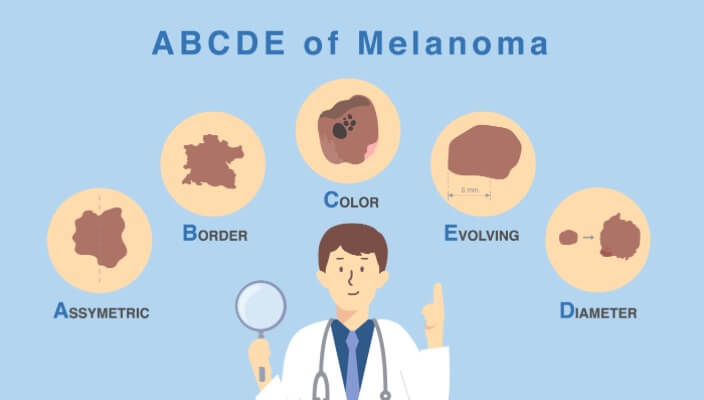
- Skin Cancer
- Skin Exams
With skin cancer cases rising year after year, it’s no surprise that people are itching to learn more about this life-threatening skin disease
Read More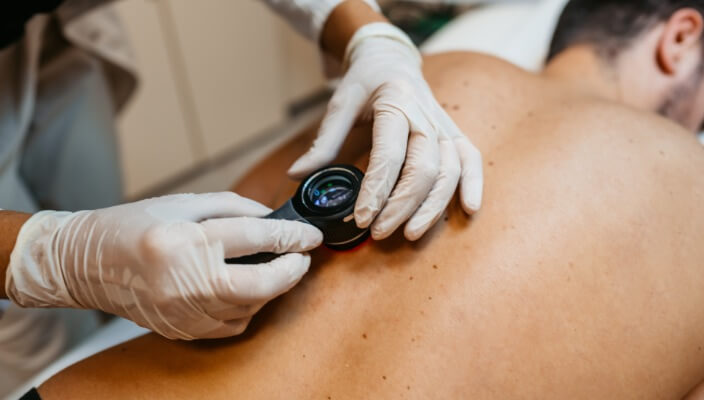
- Skin Cancer
- Skin Exams
In this blog, we’re covering what you need to know about five dangerous skin cancers, including basal cell carcinoma (BCC), squamous cell carcinoma (SCC), malignant melanoma, merkel cell carcinoma, and kaposi sarcoma.
Read More
- Skin Cancer
- General Dermatology
- Skin Exams
Navigating the landscape of Total Body Skin Exams: Uncover the comprehensive process, understand why it matters for skin health, and gain insights into what to expect during these essential dermatological examinations.
Read More
